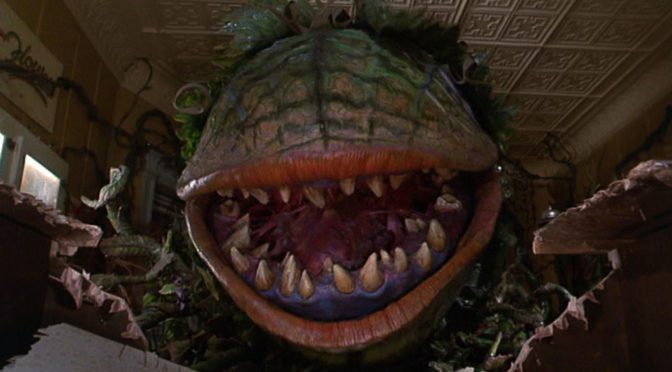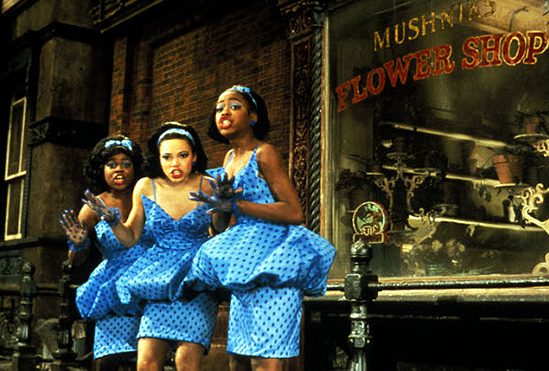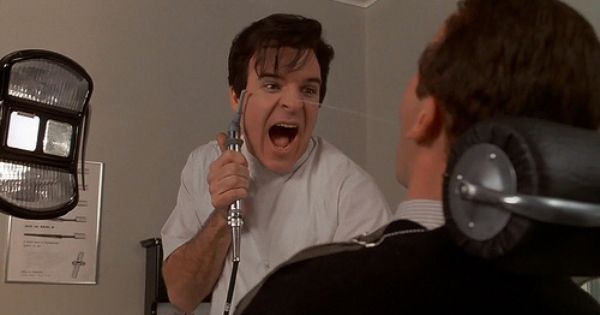“It doesn’t eat plant food.”
“This is the kind of movie that cults are made of,” Roger Ebert wrote in his original 1986 review of Little Shop of Horrors, and it’s easy to see how we could come to that conclusion. Like Rocky Horror Picture Show, Little Shop wears its giddiness on its sleeve, and the pure joy the cast takes in putting on a show is infectious (although Little Shop, thankfully, lacks Rocky Horror‘s annoying, tacky fanbase). Little Shop of Horrors manages to be both innocuous and ambitious; satirical and unabashedly sweet; funny and bleak. Halfway through the film I realized that this might be one of my new favorite musicals.
Oddly enough, I stayed away from this for so long because I’ve never particularly cared for Rick Moranis. I find his character in Ghostbusters grating, and I’m not one of those people fueled by irony who will suggest that Honey, I Shrunk the Kids is worth repeat viewings (ditto Space Jam, but that’s neither here nor there). But Moranis is a revelation here. Playing Seymour Krelborn, a down-on-his-luck florist in the skid row section of an unnamed city, Moranis commands the screen in a hangdog, gentile Woody Allen kind of way. And he possesses a quite frankly remarkable voice; when he adds his voice to “Skid Row (Downtown)” he sounds like Hairspray‘s Corny Collins, a matinee idol and a parody of a matinee idol packed into the same slump-shouldered body.
Seymour’s luck turns around when, after an eclipse, he grows a strange and interesting plant which he thinks could help attract customers to the flower shop (he puts it in the window; cue Christopher Guest, entering immediately: “What’s that strange and interesting plant?”). He names it Audrey II (one of the best names I’ve ever heard for a monster) after his workplace crush Audrey (Ellen Greene, with perfect breathy, baby-doll delivery). Before long, Audrey II has grown to nearly the size of the room and revealed that she feeds on blood. If the plant didn’t talk (it’s voiced by Levi Stubbs of the Four Tops), and the songs weren’t so catchy and hilarious, Little Shop of Horrors would be a weird, idiosyncratic horror movie.
Instead, it’s a weird, idiosyncratic musical. The songs, by Alan Menken of Aladdin and Beauty and the Beast fame, are mostly vivacious doo-wop tunes, performed by a Greek chorus of singers played by Tichina Arnold, Michelle Weeks, and Tisha Campbell. Occasionally the film veers into more traditional musical fare like the lovely “Suddenly Seymour.” Menken, operating outside his normal comfort zone, does more than embrace doo-wop; he knows its ins and outs, what makes it work, and with that knowledge he expertly replicates the Wall of Sound vibe that Phil Spector created for the Ronettes.
This movie is fun, the gleeful, unironic kind of fun that makes an argument for the musical as a viable art form. The lyrics and the delivery are so goddamn funny, and the funniest song is “Dentist,” performed by Steve Martin as Orin Scrivello, the sadistic, abusive dentist who croons about how a lifetime of sadism makes him perfectly suited to that occupation. Martin’s lanky frame makes him a wonderful physical comedian, and it’s a hoot to watch him use his Elvis swagger to nonchalantly punch a nurse out or twist off a doll’s head.
As Audrey II grows in size, Little Shop takes on a darker edge, but never fully crosses over. The puppetry by Henson Studios is terrific – Audrey II has a personality and a range of motion that wouldn’t be nearly as believable if she was made in a computer (amazingly, all of the Audrey II effects are practical). It’s no shock that the film got an Oscar nomination for its visual effects (it lost to Aliens), and thirty years after Little Shop hit theaters, Audrey II is still a marvel to look at. And that’s without even mentioning the sets, made to replicate a stage but also the studio musicals of the 1930s. Everything looks artificial – you can see the background is a matte painting – but that just adds to the film’s charming aesthetic.
The film really embraces its underlying darkness in its third act, culminating in an ending so dark that the studio made director Frank Oz go back and reshoot it (it’s available on DVD, thankfully). Audrey II wounds Audrey, and at her request, Seymour feeds her to the plant after she dies. It’s an oddly sweet scene, and Audrey II is uncharacteristically gentle with her namesake’s body (you can see how much redder the inside of its mouth has gotten, too; a deep red as opposed to the blues and purples of its youth). The plant then eats Seymour, as the finale of the Oscar-nominated song “Mean Green Mother from Outer Space” (guys, the music is seriously so amazing). Audrey II self-replicates and takes over the entire country, rampaging through New York like the Cloverfield monster. Back when I reviewed The Cabin in the Woods for this feature, I mentioned that I couldn’t think of any other film with such startlingly different beginning and ending scenes. I can now add Little Shop of Horrors to that list.
Little Shop of Horrors might not be a scary movie, and in that sense it fits the theme of this feature as poorly as Hocus Pocus did, but it’s a classic monster movie nonetheless. But the reason I love Little Shop is the same reason I love Halloween – more than most movies, this film is a great reminder that horror can be a lot of fun.
10/1: Dawn of the Dead (2004)
10/2: The Exorcist
10/3: Pontypool
10/4: Hocus Pocus
10/5: The Orphanage
10/6: Rosemary’s Baby
10/7: Alien
10/8: Scream series
10/9: Scream series
10/10: Cujo
10/11: The Cabin in the Woods
10/12: Pulse
10/13: The Babadook
10/14: Friday the 13th
10/15: The Last House on the Left (both versions)
10/16: The Thing (both versions)
10/17: Little Shop of Horrors
10/18: Hush
10/19: Silent Hill
10/20: The Shining
10/21: Funny Games (2007)
10/22: Evil Dead series
10/23: Evil Dead series
10/24: The Mist
10/25: The Ninth Gate
10/26: The Fly
10/27: A Nightmare on Elm Street
10/28: The Nightmare Before Christmas
10/29: 28 Days Later/28 Weeks Later
10/30: It
10/31: Halloween (either version)



